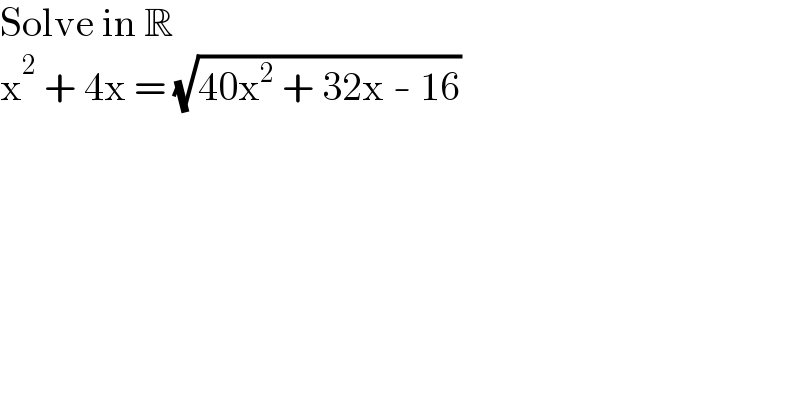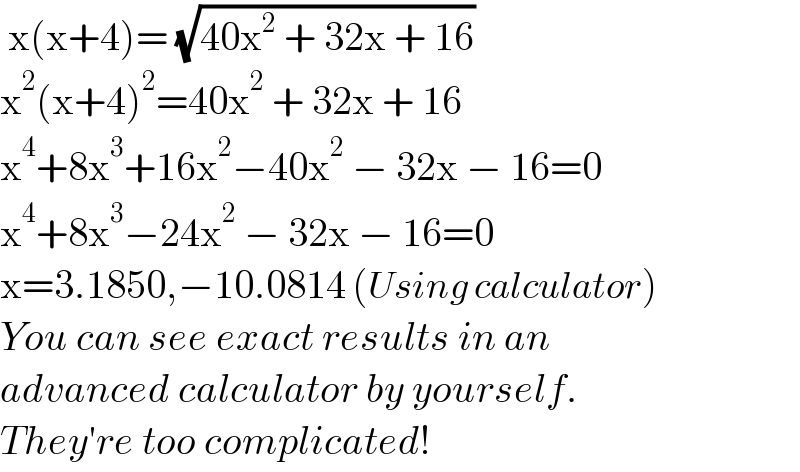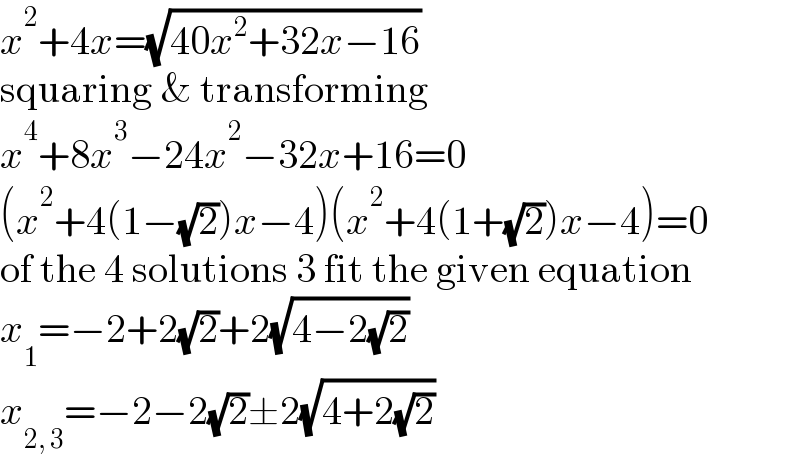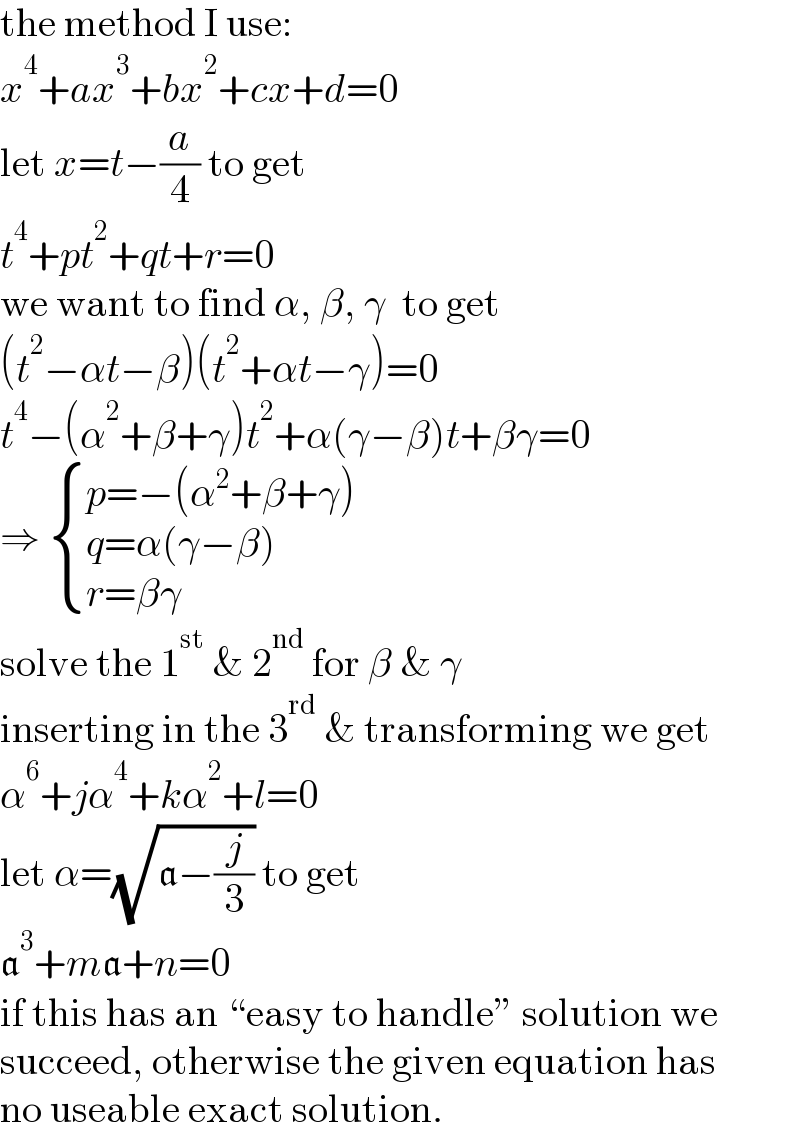
Question Number 156809 by MathSh last updated on 15/Oct/21

$$\mathrm{Solve}\:\mathrm{in}\:\mathbb{R} \\ $$$$\mathrm{x}^{\mathrm{2}} \:+\:\mathrm{4x}\:=\:\sqrt{\mathrm{40x}^{\mathrm{2}} \:+\:\mathrm{32x}\:-\:\mathrm{16}} \\ $$
Commented by MathSh last updated on 15/Oct/21

$$\mathrm{Yes}\:\mathrm{dear}\:\boldsymbol{\mathrm{S}}\mathrm{er} \\ $$
Answered by Rasheed.Sindhi last updated on 15/Oct/21

$$\:\mathrm{x}\left(\mathrm{x}+\mathrm{4}\right)=\:\sqrt{\mathrm{40x}^{\mathrm{2}} \:+\:\mathrm{32x}\:+\:\mathrm{16}} \\ $$$$\mathrm{x}^{\mathrm{2}} \left(\mathrm{x}+\mathrm{4}\right)^{\mathrm{2}} =\mathrm{40x}^{\mathrm{2}} \:+\:\mathrm{32x}\:+\:\mathrm{16} \\ $$$$\mathrm{x}^{\mathrm{4}} +\mathrm{8x}^{\mathrm{3}} +\mathrm{16x}^{\mathrm{2}} −\mathrm{40x}^{\mathrm{2}} \:−\:\mathrm{32x}\:−\:\mathrm{16}=\mathrm{0} \\ $$$$\mathrm{x}^{\mathrm{4}} +\mathrm{8x}^{\mathrm{3}} −\mathrm{24x}^{\mathrm{2}} \:−\:\mathrm{32x}\:−\:\mathrm{16}=\mathrm{0} \\ $$$$\mathrm{x}=\mathrm{3}.\mathrm{1850},−\mathrm{10}.\mathrm{0814}\:\left({Using}\:{calculator}\right) \\ $$$${You}\:{can}\:{see}\:{exact}\:{results}\:{in}\:{an} \\ $$$${advanced}\:{calculator}\:{by}\:{yourself}. \\ $$$${They}'{re}\:{too}\:{complicated}! \\ $$
Answered by MJS_new last updated on 16/Oct/21

$${x}^{\mathrm{2}} +\mathrm{4}{x}=\sqrt{\mathrm{40}{x}^{\mathrm{2}} +\mathrm{32}{x}−\mathrm{16}} \\ $$$$\mathrm{squaring}\:\&\:\mathrm{transforming} \\ $$$${x}^{\mathrm{4}} +\mathrm{8}{x}^{\mathrm{3}} −\mathrm{24}{x}^{\mathrm{2}} −\mathrm{32}{x}+\mathrm{16}=\mathrm{0} \\ $$$$\left({x}^{\mathrm{2}} +\mathrm{4}\left(\mathrm{1}−\sqrt{\mathrm{2}}\right){x}−\mathrm{4}\right)\left({x}^{\mathrm{2}} +\mathrm{4}\left(\mathrm{1}+\sqrt{\mathrm{2}}\right){x}−\mathrm{4}\right)=\mathrm{0} \\ $$$$\mathrm{of}\:\mathrm{the}\:\mathrm{4}\:\mathrm{solutions}\:\mathrm{3}\:\mathrm{fit}\:\mathrm{the}\:\mathrm{given}\:\mathrm{equation} \\ $$$${x}_{\mathrm{1}} =−\mathrm{2}+\mathrm{2}\sqrt{\mathrm{2}}+\mathrm{2}\sqrt{\mathrm{4}−\mathrm{2}\sqrt{\mathrm{2}}} \\ $$$${x}_{\mathrm{2},\:\mathrm{3}} =−\mathrm{2}−\mathrm{2}\sqrt{\mathrm{2}}\pm\mathrm{2}\sqrt{\mathrm{4}+\mathrm{2}\sqrt{\mathrm{2}}} \\ $$
Commented by MJS_new last updated on 16/Oct/21

$$\mathrm{yes}.\:\mathrm{if}\:\mathrm{the}\:\mathrm{equation}\:\mathrm{for}\:\mathfrak{a}\:\mathrm{has}\:\mathrm{only}\:\mathrm{1}\:\mathrm{real} \\ $$$$\mathrm{solution}\:\left(\mathrm{Cardano}\right)\:\mathrm{or}\:\mathrm{if}\:\mathrm{it}\:\mathrm{has}\:\mathrm{3}\:\mathrm{real}\:\mathrm{solutions} \\ $$$$\mathrm{of}\:\mathrm{trigonometric}\:\mathrm{shape}\:\mathrm{we}\:\mathrm{cannot}\:\mathrm{use}\:\mathrm{them}. \\ $$$$\mathrm{we}\:\mathrm{must}\:\mathrm{hope}\:\mathrm{for}\:\mathrm{easy}\:\mathrm{solutions}\:\in\mathbb{Q}\:\mathrm{to}\:\mathrm{be} \\ $$$$\mathrm{found}\:\mathrm{within}\:\mathrm{the}\:\mathrm{factors}\:\mathrm{of}\:\pm{n} \\ $$
Commented by MathSh last updated on 16/Oct/21

$$\mathrm{Very}\:\mathrm{nice}\:\mathrm{dear}\:\boldsymbol{\mathrm{S}}\mathrm{er}\:\mathrm{thanks} \\ $$
Commented by Rasheed.Sindhi last updated on 16/Oct/21

$$\boldsymbol{\mathcal{T}{hanks}}\:{for}\:{precious}\:{knowledge}! \\ $$
Commented by MJS_new last updated on 16/Oct/21

$$\mathrm{you}'\mathrm{re}\:\mathrm{welcome} \\ $$
Commented by Rasheed.Sindhi last updated on 16/Oct/21

$${Sir},\:{how}\:{did}\:{you}\:{factor}\:{the}\:{equation}? \\ $$
Commented by MJS_new last updated on 16/Oct/21

$$\mathrm{the}\:\mathrm{method}\:\mathrm{I}\:\mathrm{use}: \\ $$$${x}^{\mathrm{4}} +{ax}^{\mathrm{3}} +{bx}^{\mathrm{2}} +{cx}+{d}=\mathrm{0} \\ $$$$\mathrm{let}\:{x}={t}−\frac{{a}}{\mathrm{4}}\:\mathrm{to}\:\mathrm{get} \\ $$$${t}^{\mathrm{4}} +{pt}^{\mathrm{2}} +{qt}+{r}=\mathrm{0} \\ $$$$\mathrm{we}\:\mathrm{want}\:\mathrm{to}\:\mathrm{find}\:\alpha,\:\beta,\:\gamma\:\:\mathrm{to}\:\mathrm{get} \\ $$$$\left({t}^{\mathrm{2}} −\alpha{t}−\beta\right)\left({t}^{\mathrm{2}} +\alpha{t}−\gamma\right)=\mathrm{0} \\ $$$${t}^{\mathrm{4}} −\left(\alpha^{\mathrm{2}} +\beta+\gamma\right){t}^{\mathrm{2}} +\alpha\left(\gamma−\beta\right){t}+\beta\gamma=\mathrm{0} \\ $$$$\Rightarrow\:\begin{cases}{{p}=−\left(\alpha^{\mathrm{2}} +\beta+\gamma\right)}\\{{q}=\alpha\left(\gamma−\beta\right)}\\{{r}=\beta\gamma}\end{cases} \\ $$$$\mathrm{solve}\:\mathrm{the}\:\mathrm{1}^{\mathrm{st}} \:\&\:\mathrm{2}^{\mathrm{nd}} \:\mathrm{for}\:\beta\:\&\:\gamma \\ $$$$\mathrm{inserting}\:\mathrm{in}\:\mathrm{the}\:\mathrm{3}^{\mathrm{rd}} \:\&\:\mathrm{transforming}\:\mathrm{we}\:\mathrm{get} \\ $$$$\alpha^{\mathrm{6}} +{j}\alpha^{\mathrm{4}} +{k}\alpha^{\mathrm{2}} +{l}=\mathrm{0} \\ $$$$\mathrm{let}\:\alpha=\sqrt{\mathfrak{a}−\frac{{j}}{\mathrm{3}}}\:\mathrm{to}\:\mathrm{get} \\ $$$$\mathfrak{a}^{\mathrm{3}} +{m}\mathfrak{a}+{n}=\mathrm{0} \\ $$$$\mathrm{if}\:\mathrm{this}\:\mathrm{has}\:\mathrm{an}\:``\mathrm{easy}\:\mathrm{to}\:\mathrm{handle}''\:\mathrm{solution}\:\mathrm{we} \\ $$$$\mathrm{succeed},\:\mathrm{otherwise}\:\mathrm{the}\:\mathrm{given}\:\mathrm{equation}\:\mathrm{has} \\ $$$$\mathrm{no}\:\mathrm{useable}\:\mathrm{exact}\:\mathrm{solution}. \\ $$
Commented by MJS_new last updated on 16/Oct/21

$${x}^{\mathrm{2}} +\mathrm{4}{x}=\sqrt{\mathrm{40}{x}^{\mathrm{2}} +\mathrm{32}{x}+\mathrm{16}}\:\mathrm{has}\:\mathrm{no}\:\mathrm{useable}\:\mathrm{exact}\:\mathrm{solution} \\ $$
Commented by Rasheed.Sindhi last updated on 16/Oct/21

$$\boldsymbol{\mathcal{T}{hanks}}\:\boldsymbol{{a}}\:\boldsymbol{{lot}}\:\boldsymbol{{sir}}!\:{I}\:{used}\:{a}\:{calculator} \\ $$$${and}\:{it}\:{gave}\:{me}\:{terrible}\:{answers} \\ $$$${in}\:{exact}\:{form}! \\ $$
